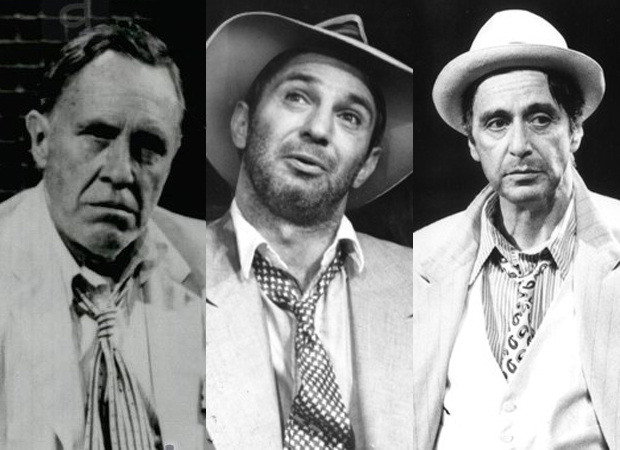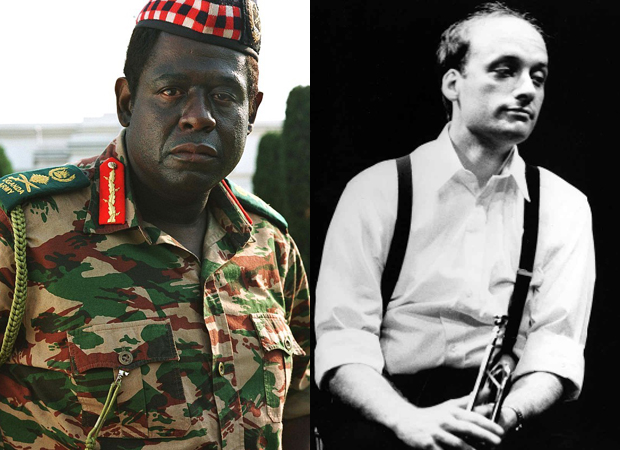Forest Whitaker and Frank Wood on Getting to Know Hughie
Michael Grandage directs Eugene O’Neill’s two-hander on Broadway.

(© David Gordon)
"It is a real challenge," Forest Whitaker says. "I was thinking about that the other day."
Even for an actor as acclaimed as Whitaker, one of his generation's greats who earned an Oscar for his performance as Idi Amin in The Last King of Scotland, the idea of doing Broadway for the first time is intimidating. Doubly so when his first outing is a play by Eugene O'Neill. Triply so when the play is essentially one long monologue.
Whitaker is following in the footsteps of Jason Robards, Ben Gazarra, and Al Pacino in the starring role of Eugene O’Neill’s Hughie, the playwright's 1942 two-hander. He plays Erie Smith, a small-time gambler and major alcoholic whose luck has gone dry since the death of his dear pal Hughie, the night clerk at the Manhattan hotel where Erie resides. Erie arrives home from a bender to be greeted by the new night clerk, Charlie Hughes, another lost soul (here played by Tony winner Frank Wood), who dreams of being anywhere else.
He didn't know the play when Darren Bagert, the revival's lead producer, sent it to him. "I read it and I wasn't quite sure," Whitaker notes. But Bagert was sold from the get-go. "It's catnip for the right actor," Bagert says. "I thought, as a character actor, if anyone would be willing and up to the task, it would be him. But I wasn't sure; a lot of the weight is on his shoulders."
It took several reads, but eventually Whitaker was sold. "I looked at it a few more times and started to say, 'Wow, this has so many powerful themes in it, and there's an amazing relationship between these men. Let me give it a try.'"

While Whitaker has a mountain to climb in terms of dialogue, Wood has a similar Everest: He spends the entire play in a world of his own thoughts, delivering what probably amounts to five minutes of the hour-long play's actual dialogue. "For many actors," Wood notes, "it fulfills one kind of fantasy: on the simplest level, it's another actor's job to say all the words. But I think most actors like the act of repression in a play, [where] their silence is actually agony. When someone says a lot of things to you and you don't respond, a lot happens to you on the inside. It's a really wonderful experiment in how stakes are built. When you don't get to say a lot, you figure out what matters and what doesn’t."
In the view of director Michael Grandage, the relationships, however disconnected they may be to start out, are the key to unlocking the work. "It's a play about three dead people, really," he says. "Hughie is actually dead and was buried before the play begins; the Night Clerk has lost his will to live and is a virtual dead man, and Erie, rather tragically, is dying in front of us because he's lost his reason to live, which is Hughie. It's a rather remarkable piece of work in that respect, because O'Neill sets that up and then brings two of those characters back to life by finding a common bond. Out of that comes the possibility of hope."
"I think it throws people off," Whitaker notes of the play's surprising hopefulness. Even though Erie shares similar self-destructive characteristics with O'Neill's other tragic heroes, he's actually quite different from Hickey and James Tyrone. "He's coming off a bender when you first meet him. He talks about having the DTs. But it has a theme of, 'I can make it. I'm just going to keep going. No matter how simple my life may be, I do matter.'"
It's a feeling Erie experiences and one the Night Clerk does too, even though his mind is with the firefighters and ambulances on the street. "He's trying to find some traction for his psyche to feel OK," Wood says. "As the play progresses, he realizes that the person who's been talking all the time might provide him the very thing he's been looking for."
Grandage is particularly impressed by Whitaker's choice of taking on such a challenging role for his first Broadway outing. "He chose a difficult drama by Eugene O'Neill to make his debut. What's very clear to me is that I now know why he did: He just really understands what to do with that character."
Whitaker flashes a smile. "It's a great opportunity, if I can meet the challenge," he says with a laugh. "I'm still working on that."

(© Neil Davidson/Carol Rosegg)








